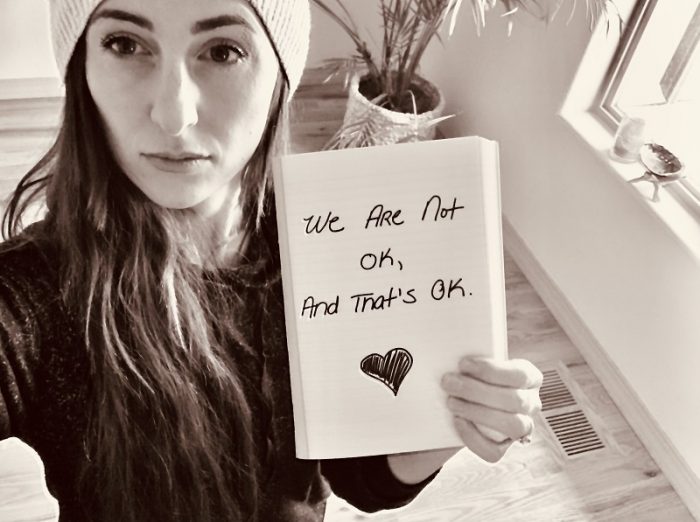“How are you?”
“Doing well, thanks! And you?”
It has served its purpose, year after year. The words themselves didn’t have much meaning—a casual, polite check-in, the cracker on which to spread our conversation.
It was a sort of permission that you have the mental and emotional space to talk sales, recipes, weather, or politics, which would, of course, be absurd to discuss should you not be “well.” This was the system. If you really weren’t okay, there was your chance to speak it.
Never mind that nobody took it; the point was in the offering.
The rare response that deviated from the standard “fine” served as a smoke signal. Friends descended and family hugged in; we’ve done our part by burying the “fine” into the pits of what we hold and letting something else roll off, unnatural though it was forming on the tongue.
“How are you?”
“Struggling.”
With this, the first responders knew what to do. We’d pinned how many quotes, risen how many prayers, kneeled how many penances, knees grinding on cold slab, to prepare for these moments. Call in the community: call mom, text Don, or maybe even the doctor.
“We have a ‘not fine.’”
Last year started in this way, but by February something completely new appeared: a virus. Pandemic. A word no longer reserved for Stephen King or speculative journalism. A presence, here. Around us. But where? The groundhog missed his shadow, and we understood this to mean that we must bunker now, but it would pass soon. There’d be an early spring.
Winter turned to mud with Earth’s axis tilting our stance awkwardly—knuckles protruding, we gripped to this system that we knew. We were a people of determination—to remain fine. We watched the news, stayed home when they told us to stay home, and limited our exposure to the number of people in our bubble.
There was reassurance in compliance.
There was reassurance in dissent.
We missed connections—real ones, hugs, and the smell of them—and getting dressed up to meet for breakfast. Children with their teachers, and space to ask each other, or ourselves, how are you? Principals whose focus was to support their teachers, having weekly meetings, children out to recess, and snot not so offensive. Space to ask the group: how are you? Humans, surrounded by their loved ones, freshly stepping into the cold white of a hospital room, disrobing from a past, and tying on the soft cotton, scented with bleach—reassurance of sterility. The doctor could enter, cheerful, backed by years of medicine and algorithms for saving a life. Hello, I’m Dr. How are you?
Touch. Handshakes. Nourishment. No time to miss them. Set them in the corner. You’re fine.
We made way for new life in spring, asking with less airiness, more urgency: How are you?
It was no longer polite—it was demanding. No time for apathy. People were dying, once-vibrant spirits collapsing. We required marching orders, not apathy.
How are you?
“In need of groceries. And toilet paper.”
Actionable requests. We absorbed them like hope, devising community grocery collections, color-coded systems to communicate wordlessly out our window: green for “all good,” red for “help please.” We had Zoom happy hours, toasting a glass screen toward the lined skin of a mother’s hand, and it was kind of cute in the moment, this “playing virus.” Maybe these would be the stories we’d tell, together, on the other side. Possibly as soon as Easter.
Summer was not so bad. Bad, like any pandemic should be, but tolerable. If you survived, and most did, you projected that with numbers trending this way, you’d be safe by the holidays. Maybe there was some idiot truth in the hope, “It will just disappear.” It certainly seemed to maybe be true.
We inhaled gasping gulps, hope in that space of “maybe.”
How are you?
No longer speaking about the present, dissociated from that space but projecting to the future, we answered for the future us:
“We’ll be fine.”
But characters in stories never know the page count in their saga, do they? We never meant to be a nation of liars. The reader turns smug, as Christopher thinks he’s reached the New World, yet we still hold 100 more pages there in our hands.
Sweet, naive Christopher.
And so, the death came inside—leaves and bodies exhausted with clinging to summer’s last breath. The words we used changed from thousands of “others,” to hundreds of “ours.”
Not children. Some children. Mitzie’s niece.
Mostly the elderly; whole nursing homes.
Then Ahmad’s grandmother. Jerome’s father. Jerome’s mother. Also, Jerome’s sister.
Dr. Santon, and also two of the nurses up in the ICU.
Whole, refrigerated semis, containing family, teachers, caregivers, doctors.
Real as stone for those who knew, and probable conspiracy for those who couldn’t.
We continued to ask, despite growing fear of the answer, because the phrase was warm and kind, and we were a people chilled with death and unable to entertain that winter would again come.
The words bore their last memory of the year just prior, still so close we could almost close our eyes and call this all a scheme.
The hardship wore the response thin.
How are you?
“Oh. Fine.”
The “oh” was genius, really. A secret handshake. We understood it to mean “not okay, and I know you are not either.” The hierarchy of “fine” and “not fine” was lost—the relationship that depended on “in need” and “able to help,” dissolved.
What did it matter how we were?
The alarms became a backdrop, sirens wailing to the tune of Christmas music.
The responders’ posts empty, as the snow gently fell.
Death.
Of businesses we’d built, not yet paid off, and hardly even paid up—a problem, like hope, not built to survive this long. The coffee shops we wrote in, the boutiques we chose a sweater in, the restaurant down the street with the best Thai, spicy sweet aromas that entered through the nose and mixed with the coconut in your throat, a healing salve by the time it all danced together in the belly.
A tavern that couldn’t survive face masks, while human bodies might.
Marriages, previously hanging on by the routine that was their demise and also their substance. Paychecks, on which sat expectations, mortgages, school loans.
Notes, that never meant to ask the question: “How are you?” How are you being the concern of community, not paychecks and bills. And so, they didn’t come, or they came with such selfish dependability that they resembled piranhas, waiting for the soft flesh of our hands.
And so, we stopped opening.
How are you?
It was no longer just words. It was a momentary glint of the eye in another, muffled by a mask and despondency.
The grocery deliveries ceased because all ages were at risk, and what group could really afford constant exposure? John was young enough to withstand the virus, but his uncle Bill had been very ill, and he was just with him last week, so could not be safe to help. He may have it, himself. The color-coded system was forgotten, red flags taken down from the window after they’d become too sun bleached to be noticed.
We were no longer a people of action.
We were a people of implied empathy.
Unspoken; unanswered.
Friends, single and without income.
Parents, frayed.
Teachers, confused.
Children, dangling at arm’s length.
Physicians, without a promise, all with eyes shining the answers that could no longer be said.
And the irony being, of course, that once this question could truly connect us, we stopped asking.
How are you?
[Not okay.]How are you?
[I don’t know how to care for them.]How are you?
[I don’t know how to care for myself.]How are you?
[I can’t breathe.]How are you?
[Gasping.]How are you?
[A wet gurgle, sponge-soaked lungs no longer able to cough it out.]How are you?
[Rich pink and chocolate, both settling to tepid blue at the end. Stillness.]How are you?
The snow falls like grace,
Covered in that which we thought we could not bear.
As we turn to our Apple accessories, ending the year—the year we stopped asking.
~


 Share on bsky
Share on bsky



Read 15 comments and reply